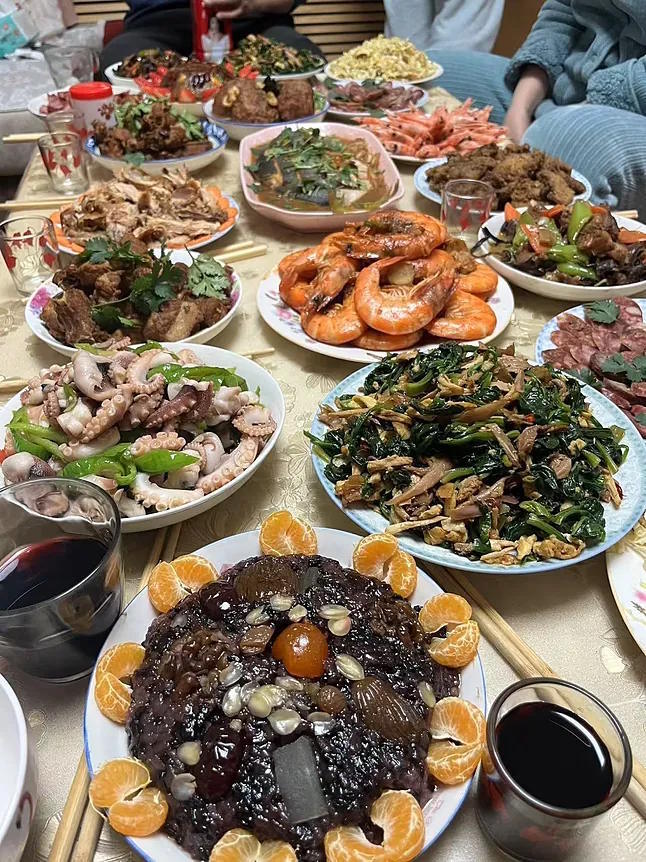Fireworks and firecrackers scare away Nián, a mythological demon who fears noise and the color red. Therefore, despite the prohibition of all pyrotechnic toys as an environmental measure against pollution, the noise is the soundtrack that accompanies the celebrations for the Chinese New Year in Longkou, a municipality in eastern China, on the coast of the Bohai Sea. In addition to setting off firecrackers, Yuan Li, a 49-year-old accountant who embraces the deeply rooted superstitious customs of his country, sits on the sidewalk at a four-way intersection and begins to burn a bundle of fake bills and yellow papers with messages for his ancestors.
"It is an offering we make to our deceased family members, a way to honor them and make them feel comfortable on the other side. These bills transform when burned into material goods that our loved ones in the afterlife can use. I have written my home address on the papers so that the spirits of my ancestors can also come to celebrate the New Year's entry," explains Yuan. "The ideal is to burn the paper at an intersection because it is a point of connection between different paths, between the world of the living and the world of the dead." In Chinese tradition, it is believed that there are wandering spirits unable to find the light, and burning these papers at street intersections helps them find the right path.
Longkou, which means dragon's mouth, dances between its agricultural past and its prosperous industrial present. The snowy landscape these days intertwines with the red lanterns placed on every corner. Families like Yuan's have thoroughly cleaned their homes and cars to rid themselves of the bad vibes from the previous year. All homes are decorated with poetic couplets with the character engraved with Fú, which means happiness.
This 2025 marks the celebration of the year of the wood snake. In Chinese astrology, there are 12 zodiac signs with an animal paired with one of the five elements (metal, wood, water, fire, and earth) to seek harmony and balance. Among the personalities born under the sign of the snake are Mahatma Gandhi, Mao Zedong, Pablo Picasso, and Taylor Swift. The celebration begins with the Nián yè fàn banquet, the equivalent of our New Year's Eve dinner.
The Yuan household is filled with all kinds of traditional lavish dishes, up to 28 dishes for the nine people seated at the table: shrimp, seaweed salad, pig's blood, gelatinous rice with strawberries, potato noodles with mushrooms and chicken, sweet and spicy sausages, giant meatballs, ribs, fried eggplant bathed in soy sauce, fish with oyster sauce...
These carefully selected foods have symbolic meanings. For example, noodles represent longevity and fish symbolizes abundance. At midnight, equivalent to eating grapes in Spain, in China, the famous dumplings are eaten, evoking good fortune. There are two types of homemade Chinese dumplings (jiaozi) served at the Yuan household: pork with cabbage wrapped in a flour dough and spinach, and another made with the dragon fruit, purple in color, excellent for digestion. The other jiaozi, made with conventional white dough, contain cuttlefish, chives, and egg.
The family has set aside three plates filled with this food for the spirits of the ancestors, another habit in China deeply rooted in its dynastic traditions. Like inserting six coins inside the dumplings, and whoever finds them is said to have a good year ahead.
After the second and also abundant dinner, the older members of the family, grandparents, and uncles, distribute hóngbo, red envelopes with bills (real ones) totaling an amount that ends in an even number, a sign of auspiciousness.
The tradition of red envelopes dates back to the Han dynasty (206 BC-220 AD), where they were used to ward off evil spirits. Nowadays, in many homes, this practice has evolved into digital payments, with platforms like WeChat - the Chinese counterpart of WhatsApp - offering a feature to send digital red envelopes with yuan, the local currency, to other accounts. This year, the Chinese government has warned its officials to reject these gifts if they come from subordinates, whether virtual or physical envelopes, as it can be interpreted as a bribe.
Before the envelopes and the dumplings, after finishing dinner around 8:00 p.m., families gather on the couch to watch the New Year's gala. The public broadcaster CCTV has been broadcasting it live since 1983 and is the most-watched program in the world each year, with an average audience exceeding 1 billion viewers.
It is a very patriotic show featuring the country's most famous artists. There are opera performances, Kung Fu displays, monologues, dance, ethnic dances, Western groups (the popular American band OneRepublic performed in the city of Wuhan), military parades, and astronauts from the Chinese space station showcasing the most important technological achievements of the past year. The most outstanding performance was by black humanoids dancing with red pom-poms. Yuan's younger brother is hooked on the global phenomenon of the chatbot DeepSeek and explains to his parents, both septuagenarians, that this AI assistant can keep them company and answer all their questions.
This Wednesday, the first day of the year of the snake, the Yuan family has been visiting the homes of relatives and friends. In Longkou, guests usually bring fruit trays and milk cartons to houses. Many families also visit cemeteries to make offerings to their ancestors, lighting incense and leaving food on the graves as a gesture of gratitude and respect.
